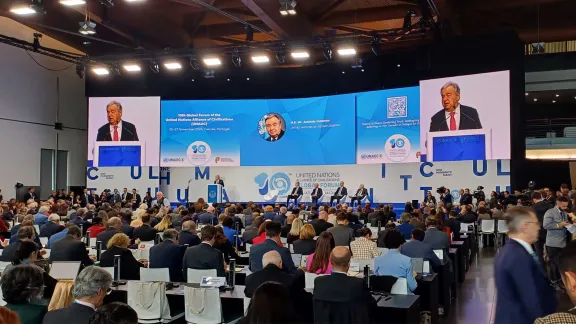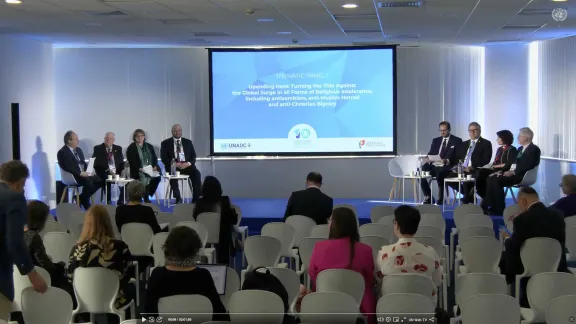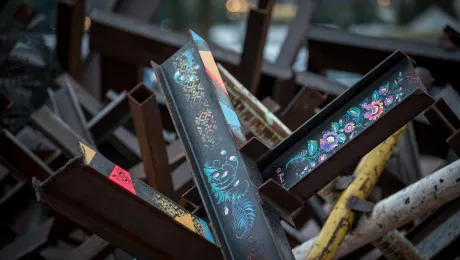
“United in Peace: Restoring Trust, Reshaping the Future” is the theme of the 10th Global Forum of the United Nations Alliance of Civilizations. Photo: UNAOC
At UN Forum, LWF General Secretary calls for collective action to address fear-driven hate and promote inclusivity
(LWI) - In an era of increasing global tensions, religious communities have a responsibility to transform fear into hope. This was the message of The Lutheran World Federation (LWF) General Secretary Rev. Dr. Anne Burghardt at a United Nations forum earlier this week.
Speaking at a high-level panel during the 10th Global Forum of the United Nations Alliance of Civilizations (UNAOC) in Cascais, Portugal, Burghardt articulated a vision for faith-based leadership in addressing worldwide polarization and religious intolerance. Formed in 2005, the UNOAC is the premier global platform for intercultural dialogue, understanding, and cooperation, set under the auspices of the United Nations.
The panel, which brought together religious leaders, diplomats, and human rights advocates, focused on concrete strategies for countering the surge in antisemitism, anti-Muslim hatred, and anti-Christian bigotry. As religious communities represent nearly 90 percent of the global population, according to recent demographic studies, their potential for fostering positive change cannot be overlooked.
Love casts out fear
"Polarization and misinformation rank among the most pressing challenges and global risks of our time," Burghardt observed, emphasizing the need to understand and address their root causes. She highlighted how certain political movements have used fear to create division, “fear of losing power, fear of identity, fear of the pace of change in the world.”

"Upending Hate: Turning the Tide Against the Global Surge in all Forms of Religious Intolerance, including antisemitism, anti-Musim Hatred and anti-Christian Bigotry” was the topic of the panel. Photo: UNAOC

General Secretary Burghardt advocated for broader inclusion in peacebuilding efforts, particularly emphasizing the vital roles of youth and women. Photo: UNAOC
Drawing on the Bible, Burghardt discussed the relationship between fear and hope in Christianity. “In the First Letter of John we read that perfect love casts out fear," she said. “But, unfortunately, it also works the other way around, fear casts out love.” As faith leaders and religious people, we are called to “stand for our shared humanity and to respect the dignity of others.” She also highlighted the importance of religious communities remaining self-critical and taking responsibility for those in their ranks who use sacred texts to divide and exclude.
Burghardt emphasized the power of storytelling and personal testimony to foster connection between people. “Formal statements never really reach the hearts of our constituencies, whereas authentic stories from our communities have a transformative power to change hearts and minds," she noted. She shared examples of successful interfaith initiatives from LWF's global work, where dialogue has built bridges across religious divides.
I believe that religious actors need to be brought more on board.
Anne BURGHARDT, LWF General Secretary
Looking toward the future, Burghardt also advocated for broader inclusion in peacebuilding efforts, particularly emphasizing the vital roles of youth and women. In regions like Africa, “young people constitute the majority of the population therefore it is crucial to include them in dialogue, in shaping the future where the human dignity of other is respected. The voices and perspectives of young people are essential in the work for peace," she explained.
She also referred to the recently concluded Summit of the Future, noting that faith communities and faith leaders received limited attention in the Pact for the Future. “If the UN and other global multilateral organizations want to make an impact, I believe that religious actors need to be brought more on board,” she emphasized.
The panel, titled "Upending Hate: Turning the Tide Against the Global Surge in all Forms of Religious Intolerance, including antisemitism, anti-Musim Hatred and anti-Christian Bigotry” was an opportunity to strengthen collaboration between religious and secular actors. The 10th Global Forum takes place 25-27 November in Cascais, Portugal. It brings together global leaders from civil society and governments under the theme “United in Peace: Restoring Trust, Reshaping the Future.”


